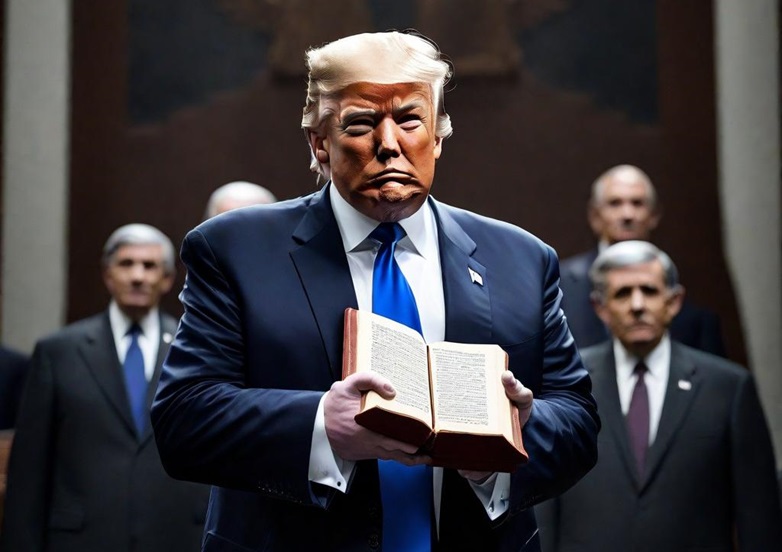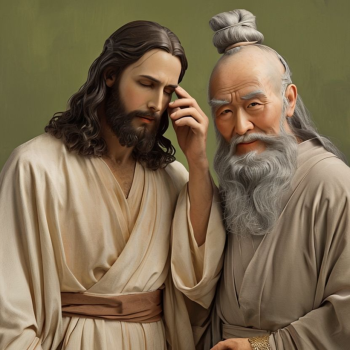In the US, February 19 is Presidents’ Day. How important is it for a President to believe in a Higher Power?

History of Presidential Affiliations
Since the founding of the United States, every President has at least claimed to be Christian. Here’s a list of the denominational affiliations of the US Presidents, according to the Pew Research Center:
Episcopalian
- George H.W. Bush
- Gerald Ford
- Franklin Roosevelt
- Chester Arthur
- Franklin Pierce
- Zachary Taylor
- John Tyler
- William Harrison
- James Monroe
- James Madison
- George Washington
Presbyterian
- Ronald Reagan
- Dwight Eisenhower
- Woodrow Wilson
- Benjamin Harrison
- Grover Cleveland
- James Buchanan
- James Polk
- Andrew Jackson
Baptist
- Bill Clinton
- Jimmy Carter
- Harry Truman
- Warren Harding
Methodist
- George W. Bush
- William McKinley
- Rutherford Hayes
- Ulysses Grant
Unitarian
- William Howard Taft
- Millard Fillmore
- John Quincy Adams
- John Adams
No Formal Affiliation
- Andrew Johnson
- Abraham Lincoln
- Thomas Jefferson
- Donald Trump
Disciples of Christ
- Lyndon Johnson
- James Garfield
Dutch Reformed
- Theodore Roosevelt
- Martin Van Buren
Quaker
- Richard Nixon
- Herbert Hoover
Roman Catholic
- John F. Kennedy
- Joe Biden
Congregationalist
- Calvin Coolidge
United Church of Christ
- Barack Obama
According to Christianity Today, Trump was “the first President since Eisenhower to change faiths in office.” While serving as President, he moved from the Presbyterian Church to calling himself a “non-denominational Christian.”
“The Founding Fathers” Were Deists
Many who promote the idea that America is a Christian nation point to the fact that the “founding fathers” were Christians. In truth, while they were members of Christian churches, several of them were Deists. Nicholas Rathod writes:
Many of the founding fathers—Washington, Jefferson, Franklin, Madison and Monroe—practiced a faith called Deism. Deism is a philosophical belief in human reason as a reliable means of solving social and political problems. Deists believe in a supreme being who created the universe to operate solely by natural laws—and after creation, is absent from the world. This belief in reason over dogma helped guide the founders toward a system of government that respected faiths like Christianity, while purposely isolating both from encroaching on one another so as not to dilute the overall purpose and objectives of either.
America’s Deist “founding fathers” found Christianity to be a handy vehicle to communicate their beliefs. Yet, we must recognize the fallacy in the narrative that they were traditionally Christian. Surely, they were members of Christian denominations—but their actual beliefs differed significantly from orthodox Christianity. Still, they did believe in a Higher Power—the values of reason, liberty, equality, and justice. (At least, for landowning White men.)
Kennedy and Catholicism
John F. Kennedy, Jr. was the first Roman Catholic US President. During his campaign, many American voters asked themselves whether a Catholic President might have divided loyalties. Since the Pope is a head of state besides being a religious leader, Protestants wondered whether they might elect a President who submitted himself to the Vatican as a higher authority.
NPR reports that on September 12, 1960, then-candidate Kennedy delivered a speech in which he countered the anti-Catholic argument that he might have divided loyalties. The following is an excerpt from that speech:
I believe in an America where the separation of church and state is absolute, where no Catholic prelate would tell the president (should he be Catholic) how to act, and no Protestant minister would tell his parishioners for whom to vote; where no church or church school is granted any public funds or political preference; and where no man is denied public office merely because his religion differs from the president who might appoint him or the people who might elect him.
I believe in an America that is officially neither Catholic, Protestant nor Jewish; where no public official either requests or accepts instructions on public policy from the Pope, the National Council of Churches or any other ecclesiastical source; where no religious body seeks to impose its will directly or indirectly upon the general populace or the public acts of its officials; and where religious liberty is so indivisible that an act against one church is treated as an act against all.
While Kennedy was a Roman Catholic, he insisted that he was not the Catholic candidate for President. Instead, he was the Democratic Party’s candidate for President—who happened to be Roman Catholic. As evidenced by the fact that he won the Presidency, he clearly convinced his Protestant voters. They believed that Catholicism’s doctrines and values were close enough to their own to garner their support. Clearly, Kennedy believed in a Higher Power called Jesus Christ and upheld the American values of liberty and justice for all.
Romney and Mormonism
In 2007, when Mitt Romney ran for President, Evangelicals asked themselves similar questions. They wondered whether he might have divided loyalties between the Church of Jesus Christ of Latter-Day Saints and the Presidency. Evangelicals also wondered whether the differences in LDS doctrine might eclipse the fact that the two groups shared the same morals and values.
In the end, Romney’s Evangelical supporters decided that, even though they didn’t consider Mormons “Christian enough” to join the Evangelical fold, Romney’s support of their values was enough to win their conservative vote. Ultimately, their vote was not determined by what doctrines he believed, but by what morals he supported. It was enough for Evangelicals that Romney believed in a divine Higher Power, even if he didn’t believe in the same way they did.
Donald Trump
In 2016, when Donald Trump ran for President, he made it public he was a Presbyterian. Yet, in his desire to appeal to Evangelicals, he announced in 2020 that he had become a non-denominational Christian. Yet, his personal beliefs and behavior bear no evidence of, or resemblance to, any real Christian faith. Still, Evangelicals wrapped their arms around him because he promised to protect their interests.
According to Pew Research, “Most Americans don’t see Trump as religious; fewer than half say they think he’s Christian.” Still, he gets the Evangelical vote, not because he believes in a divine Higher Power or even personally represents their values. Instead, they vote for him because he gives them what they want.
The same Republicans who insisted that “character matters” when it came to Clinton’s affair now believe that character doesn’t matter as it relates to Donald Trump. The difference? Clinton was a Democrat, and Trump is a Republican. So, the Christian Right believes bad morals disqualify a POTUS who believes in environmental and social programs. At the same time, they support a hateful, bigoted, and immoral President as long as he holds a Bible for photo ops. Apparently, the Evangelical-led GOP no longer believes it’s important for a President to believe in a Higher Power.
Or Does He?
Or…Maybe Trump does believe in a higher power. Come to think of it, Trump has consistently demonstrated that he believes himself to be the highest power around. This is why he believes he can “grab [women] by the p*ssy.” And this is why he keeps classified documents at his personal residence, even after he’s left power. Because he believes there is no power higher than himself, he can do whatever he wants. “I could stand in the middle of 5th Avenue and shoot somebody and I wouldn’t lose voters,” Trump famously said. A Forbes article reports:
Former President Donald Trump suggested on Truth Social early Thursday he believes presidents should be allowed to “cross the line” without legal consequences, as an appeals court prepares to rule on whether he has “immunity” from criminal charges—and after Trump’s attorney suggested in court that presidents could even assassinate political rivals without being charged.
So, yes, Donald Trump does believe in a higher power—himself. He believes he can do whatever he wants, including killing political opponents. And Evangelicals are voting for this guy because he helps them get what they want. I wonder—do they even believe in their Higher Power anymore?
Should US Presidents Believe in a Higher Power?
Ultimately, a US President is going to believe one of two things. They will either believe in a Higher Power, or they will not. If they do, this doesn’t necessarily mean they believe in a Trinitarian God. In the future, we might have a President who follows Buddhism, Hinduism, Islam, Judaism, or some other religion. In that case, they will believe in a divine Higher Power like Christians do.
But even if they are not religious, a President may still believe in a Higher Power. They can do this if they uphold the ideals of freedom, justice, equality, reason, environmental concern, or other principles that are higher than themselves. A President who believes in a Higher Power will always remember that the White House is not their throne and that they serve a greater good.
But a President who believes themself to be the highest power is dangerous not just for Americans but for the entire world. Even a President who believes in no higher power at all would be better than a would-be dictator who makes a god of themself. A head of state must never be above the law. They must never place their own agenda ahead of the common good. They must uphold a standard of integrity, decency, self-respect, and respect for others.
When a political party finds a candidate who lets “justice roll on like a river, righteousness like a never-failing stream,” Christians should be proud to endorse such an individual. But until then, we must be wary of wolves in sheep’s clothing who claim to believe in a Higher Power, but who believe themselves to be above others, and above the law.














